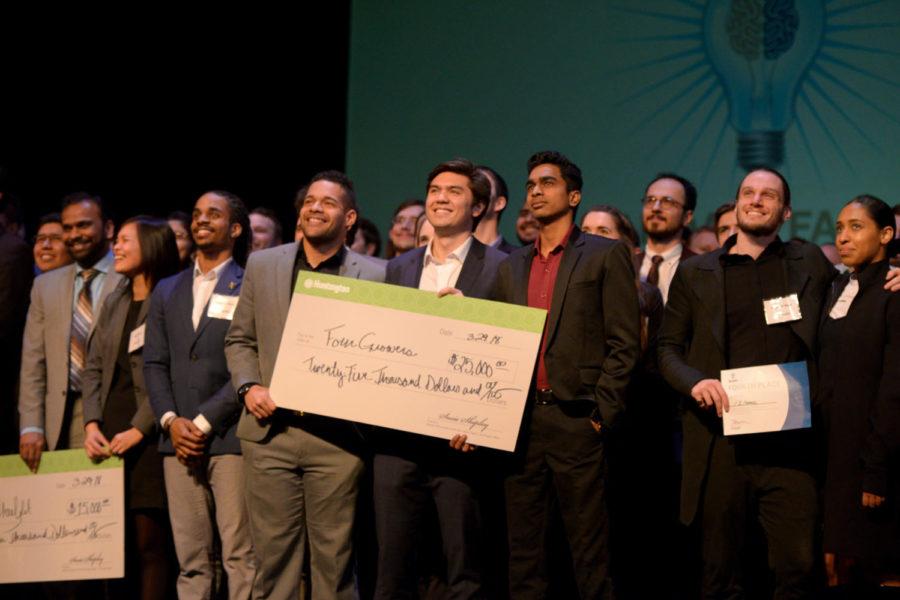In the future, the tomatoes in your salad, on your sandwich and in your pasta may be gathered by harvesters who can not only tell whether a tomato is ripe or unripe in just a few seconds, but also provide metrics and data analytics.
This idea could become a reality through the work of 2016 Pitt alum Brandon Contino, senior mechanical engineering major Dan Chi and senior neuroscience major Daniel Garcia. These three Pitt students, who comprise the company Four Growers, won the Randall Family Big Idea Competition $25,000 grand prize Thursday night for their idea of developing automated tomato harvesting robots to work in greenhouses.
Contino, CEO of Four Growers, said the team was “pleasantly surprised” when they found out they had won the 10th annual Randall Family Big Idea Competition. The event, run by the Innovation Institute, spans February to March of every year. It ends with an awards showcase where cash prizes are given to student teams whose ideas have the most startup promise. This year’s showcase was held in the Stephen Foster Memorial. 301 students from 105 teams attended to pitch and present possible start-up ideas.
Contino said the idea for the company arose when he and Chi began talking to tomato growers in spring of 2017. The two learned about the efficiency of greenhouse farming but also the limitations of labor cost, availability and reliability.
According to Contino, greenhouses are 90 percent more water efficient, and crops can be grown anywhere year-round. Four Growers stepped in when the company realized crops can be autonomously harvested. Contino said the development will also be a positive for current greenhouse workers as it will allow farms to save money and hire more employees.
“I think a big advantage to us is that we have a lot of customer discovery — almost 20 percent of the U.S. and Canadian tomato markets,” Contino said.
The emcee for the night was Babs Carryer, director of education and outreach for the Innovation Institute. Carryer said the program’s popularity and number of participants each year has steadily increased.
“Every year this competition becomes bigger and better. This year we had 105 teams, which is a 40 percent increase from previous years,” Carryer said.
The participants of the competition have to go through the what Carryer called the “Randall Gauntlet” starting in February, in which participants practice pitches and go through a mandatory bootcamp, semifinalist round, a finalist boot camp and the final round right before the showcase. Judges focused on the idea’s innovativeness, marketability, value and competition in its field.
“We help bake their ideas so that the bread rises into a product that is actually ready for the marketplace,” Carryer said.
Agricultural projects like Four Growers were accompanied by ideas from other categories like health care and informations technology solutions.
Stephen Canton, a third-year Pitt med student, was a driving force behind NephRun, a clinical mobile application for all health care students with the goal of revolutionizing medical education. NephRun improves retention by allowing students to control medical training simulations on their own time. The product specifically teaches physiology of the kidney and was developed in 24 hours at the Hackathon sponsored by Pitt.
“We are really excited about the competition, and we put in more work than we thought it would be, but if you’re passionate about something you go for it,” Canton said.
Other finalists’ ideas included a device that enables users to control their cell phone with their eyes and disposable cups that can automatically cool a beverage called Crunch Coolies.
Andrew Golio, junior mechanical engineer at Pitt and co-founder of Crunch Coolies, thought of the idea in a Chemical Product Design class taught by Dr. Chris Wilmer, a successful entrepreneur and founder of NuMat Technologies — a tech company that designs atomically engineered materials into gas delivery, separation and purification systems.
Crunch Coolies have reactive materials in their walls. Upon squeezing or crushing the cup, an endothermic reaction is activated that makes the cup cool any beverage. Golio attributed Crunch Coolie’s success in the competition to the immense research and time in the lab, as well as the constant support of Wilmer and the chemical and petroleum engineering department.
“It was overall a fun experience and made us realize the full potential and viability of our product after making it through a few rounds,” Golio said.
Chancellor Patrick Gallagher attended the competition as a guest speaker, highlighting the potential of students’ designs and encouraging commitment to acting on them.
“It’s not the big idea, it is the big things you can do with that idea.”
The award for best video went to EXG H+ Technologies. The fourth place prices of $2000 went to OtterIV, Steel Town Retractor, Glucaglin and I 2 Iconic. Adventure Hound, Aqua Bio-Chem Diamond, MeBot and PCA Buddy took home the $5,000 third place awards. Second place prizes of $15,000 went to OccuDerm, Re-Vision and Wheel Fit. Four Growers received $25,000 for winning the competition.



